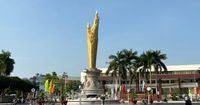On April 24, 2025, the Standing Committee of the An Giang Provincial Party Committee made a significant decision regarding the naming of communes and wards in the province. Following a wave of public discontent, officials have agreed not to use directional names such as East, West, South, and North for these localities. Instead, the committee has opted for names that reflect the local traditions, culture, and history.
The announcement came after a specialized conference chaired by Le Hong Quang, the Secretary of the Provincial Party Committee, where the executive committee discussed the adjustments needed for the administrative units at the commune level. The committee concluded that the proposed naming scheme, which incorporated geographical directions, faced considerable opposition, particularly from former provincial leaders and voters.
In a statement, a leader from the An Giang Provincial People's Committee acknowledged the backlash, stating, "The plan to name communes and wards based on directions faced a lot of opposition, especially from former provincial leaders and voters." This feedback prompted the committee to reconsider its approach and focus on names that resonate with the community's historical and cultural identity.
According to the Provincial Party Committee, specific names will be proposed by districts, towns, and cities to ensure there is no duplication following the merger of An Giang and Kien Giang provinces. This merger has created a need for careful consideration of names to avoid confusion among residents and administrative staff.
An Giang province is home to 2 cities, 1 town, 8 districts, and a total of 156 communes, wards, and towns. The Standing Committee has tasked localities with urgently collecting public opinions on the new proposed names, emphasizing the importance of community involvement in the decision-making process.
As part of this initiative, the committee has also assigned the Propaganda and Mass Mobilization Committee to lead efforts in disseminating information about the changes. This outreach aims to raise awareness and foster unity among all stakeholders, including party members, civil servants, and the general public. The goal is to ensure that everyone is informed and supportive of the new naming strategy, which aligns with the province's broader objectives of streamlining its political structure.
The decision to abandon directional names reflects a growing trend among local governments to prioritize cultural significance over geographical categorization. Critics of the directional naming scheme argued that it lacked depth and failed to honor the rich history of the region.
In the past, naming places based on directions was a common practice, but as communities evolve, there is a push to adopt names that reflect local heritage and identity. This change is seen as a way to strengthen community ties and foster a sense of belonging among residents.
As An Giang moves forward with this new approach, it will be interesting to see how the proposed names are received by the public and whether they successfully capture the essence of the local culture and history.




